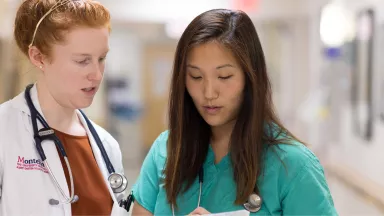Priority Service Areas: An Interdisciplinary Approach to Care
Clinical disciplines collaborate to deliver care in priority service areas such as asthma, emotional health, obesity prevention, and reproductive health. Some examples of our work are listed below:
Asthma
Medical providers deliver early treatment for asthma episodes in schools to decrease the need for emergency room care and hospitalization. With close follow-up to ensure improvement and ongoing asthma control, students obtaining these services have shown a decrease in school absenteeism. To assist in determining asthma severity and control, spirometry, a technique used to measure lung function, is now available at each site. Additionally, medical providers assess psychosocial concerns that may interfere with effective asthma control and refer children and families to on-site mental health providers.
Alongside clinical care services received by asthma patients, in the 2012-13 school year , 167 students across eight different MSHP elementary school sites participated and completed the American Lung Association’s Open Airways for Schools program. This asthma program educates and empowers children through a fun and interactive approach to asthma self-management. Our teams also conduct asthma workshops for parents, teachers and school staff, educating a community on how to best care for children with this chronic disease.
Emotional Health
Our medical and mental health providers partner around screening, referral and medication management for the students served by our program.
To facilitate identification of mental health issues, behavioral health screeners have been implemented at a majority of our school-based sites. Moving ahead, our program is working toward expansion of behavioral health screening to include both routine and acute medical visits. We also have a well-developed psychopharmacology program that provides psychotropic medication for mental health patients with depression, anxiety and ADHD diagnoses.
Obesity Prevention: Nutrition
Cooking Matters for Teens is a six-week series designed to teach teens the basics of nutrition, cooking and healthy eating. Chefs and nutritionists work in teams of two to teach a two-hour class each week for six weeks. The lessons promote a nutrition philosophy of moderation, variety and balance with the MyPlate as a focal point. The Cooking Matters for Teens classes target teens who struggle to maintain a healthy diet in a low-income household. Each class features an interactive cooking lesson with participants in the kitchen chopping, stirring and measuring right along with the chef instructors. Class participants receive a binder with supplemental materials and recipes. Each class supplements cooking and food budgeting lessons with interactive learning activities. The Montefiore School Health Program is serving as a satellite partner of City Harvest in order to bring this program to MSHP school sites.
Cornell Cooperative Extension educators work with our schools, communities and families to encourage community members to take personal responsibility for their own wellness by changing their environments to promote healthy eating and active living. Workshops provide both parents and students with the information necessary to make healthy food choices within a limited budget and choose physically active lifestyles consistent with the current Dietary Guidelines for Americans and MyPlate.
Obesity Prevention: Physical Activity
Family Adventure Program: Designed by the Community Health division, the Family Adventure Program’s primary objectives are to increase physical activity levels among families to combat obesity, enable families to become more familiar with New York City’s many affordable resources, and strengthen bonds within and between families and throughout communities. Families, alongside our community health organizers and MSHP associates, venture on monthly excursions to various destinations in New York. Activities have included visiting the Bronx Zoo, bike riding on Governor’s Island, visiting the Statue of Liberty and participating in Alvin Ailey Dance classes. Eight school campuses currently offer this program.
Summer Camp
In preparation for the summer’s out-of-school time, the Community Health division focuses its efforts on registering elementary and middle students to attend summer camps in the tri-state area and beyond. Students who are interested in new experiences, as well as developing social, life and career skills, can choose from our many local partners, including the Fresh Air Fund.
Obesity Screening
Children and adolescents are assessed annually for height, weight, body mass index (BMI), and healthy eating and fitness habits. Glucose and cholesterol screenings are also available for overweight and obese adolescents at risk for medical complications.
Reproductive Health Services
Our goal is to provide students with medically accurate information about their reproductive and sexual health, to promote access to comprehensive reproductive services, and to empower teens to make informed decisions and engage in healthy sexual behaviors. Our Community Health Organizers offer educational programs on puberty for younger students and on abstinence and sexual health education for middle school students. We advocate for and promote the Department of Education--approved
evidence-based Reducing the Risk curriculum at all our high school sites. This curriculum addresses skills such as risk assessment, communication, decision making, refusal strategies and delaying tactics.
Reproductive health clinical services are provided in the context of age-appropriate comprehensive services, to allow providers to address the issue holistically and to allow students the opportunity to ask questions in a confidential setting. In addition to counseling adolescents to delay their first sexual experience until they are emotionally and physically ready, medical providers counsel sexually-active adolescents on the various short-term and long-term reversible birth control methods that are available for on-site dispensing. Pregnancy testing, STI testing and treatment, and HIV counseling and testing are available to those students who might need it.
We encourage all adolescents to include a parent in their decision-making, and for those who feel they cannot, we ask them to identify a caring adult in their lives to provide needed guidance. Mental health referrals are made for adolescents who need additional support and options clarification in their reproductive health decision-making.
- Priority Service Areas: An Interdisciplinary Approach to Care
- Adlai E. Stevenson Campus
- Bronx Regional High School
- Christopher Columbus Campus
- DeWitt Clinton High School Campus
- Evander Childs Educational Campus
- Herbert H. Lehman Campus
- I.S. 98/Herman Ridder Campus
- I.S. 174
- I.S. 217, Entrada Academy and South Bronx Classical Charter School
- J.H.S. 151/KIPP Academy HS
- M.S. 45
- M.S. 113
- M.S. 142
- M.S. 145
- Morris High School Campus
- Mott Haven High School Campus
- New Settlement Community Campus
- P.S. 8
- P.S. 28
- P.S. 55 & Success Academy Bronx II
- P.S. 85
- P.S. 105
- P.S. 147
- P.S. 198
- P.S. 199
- P.S./M.S. 95
- South Bronx Campus
- Theodore Roosevelt Educational Campus
- William Howard Taft Campus
- Walton High School Campus




